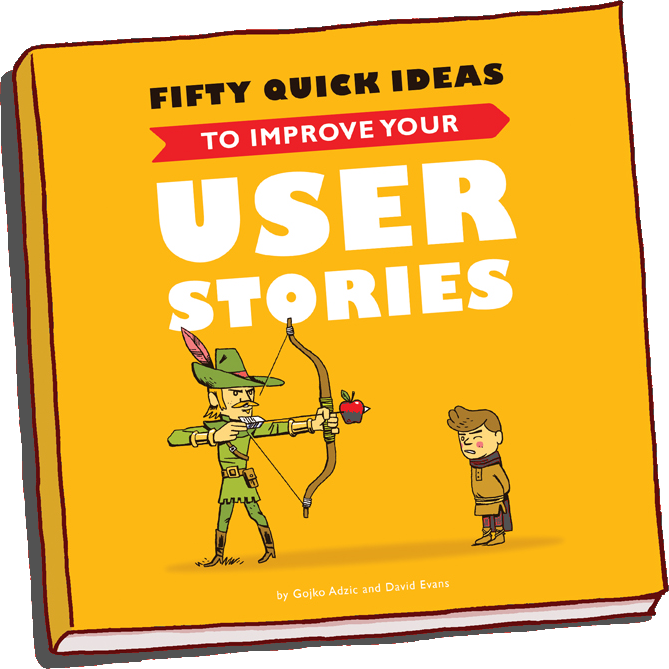Fifty Quick Ideas To Improve Your
User Stories

About the book
This book will help you write better stories, spot and fix common issues, split stories so that they are smaller but still valuable, and deal with difficult stuff like crosscutting concerns, long-term effects and non-functional requirements. Above all, this book will help you achieve the promise of agile and iterative delivery: to ensure that the right stuff gets delivered through productive discussions between delivery team members and business stakeholders.
Who is this book for?
This is a book for anyone working in an iterative delivery environment, doing planning with user stories. The ideas in this book are useful both to people relatively new to user stories and those who have been working with them for years. People who work in software delivery, regardless of their role, will find plenty of tips for engaging stakeholders better and structuring iterative plans more effectively. Business stakeholders working with software teams will discover how to provide better information to their delivery groups, how to set better priorities and how to outrun the competition by achieving more with less software.
Who is this book not for?
This book doesn't cover the basics of stories. We assume that readers know what Card-Conversation-Confirmation means, what INVEST is and how to apply the basic strategies for splitting user stories. This isn't the first book you should read about user stories, if those terms are unfamiliar. There are plenty of good basic books out there, so read them first and then come back. Please don't hate us because we skipped the basics, but there is only so much space in the book and other people cover the basics already well enough.
What's inside?
Unsurprisingly, the book contains exactly fifty ideas. They are grouped into five major parts:
- Creating stories
- This part deals with capturing information about stories before they get accepted into the delivery pipeline. You'll find ideas about what kind of information to note down on story cards and how to quickly spot potential problems.
- Planning with stories
- This part contains ideas that will help you manage the big-picture view, set milestones and organise long-term work.
- Discussing stories
- User stories are all about effective conversations, and this part contains ideas to improve discussions between delivery teams and business stakeholders. You'll find out how to discover hidden assumptions and how to facilitate effective conversations to ensure shared understanding.
- Splitting stories
- The ideas in this part will help you deal with large and difficult stories, offering several strategies for dividing them into smaller chunks that will help you learn fast and deliver value quickly.
- Managing iterative
delivery - This part contains ideas that will help you work with user stories in the short and mid term, manage capacity, prioritise and reduce scope to achieve the most with the least software.
Each part contains ideas that we've used with teams over the last five or six years to help them manage user stories better and get more value out of iterative delivery. These ideas come from many different contexts, from large investment banks working on internal IT initiatives to small web start-ups shipping consumer software. Software delivery is incredibly contextual, so some stories will apply to your situation, and some won't. Treat all the proposals in this book as experiments -- try them out and if they help keep doing them.
About the authors
Gojko Adzic is a strategic software delivery consultant who works with ambitious teams to improve the quality of their software products and processes. Gojko won the 2012 Jolt Award for the best book, was voted by peers as the most influential agile testing professional in 2011, and his blog won the UK Agile Award for the best online publication in 2010. To get in touch, write to gojko@neuri.com or visit gojko.net.
David Evans is a consultant, coach and trainer specialising in the field of Agile Quality. David helps organisations with strategic process improvement and coaches teams on effective agile practice. He is regularly in demand as a conference speaker and has had several articles published in international journals. Contact David at david.evans@neuri.com or follow him on Twitter
Contact
For all information regarding translation rights, copyright or bulk discount, send us an e-mail at publishing@neuri.co.uk or write to
Neuri Consulting LLP25 Southampton Buildings
London WC2A 1AL
United Kingdom